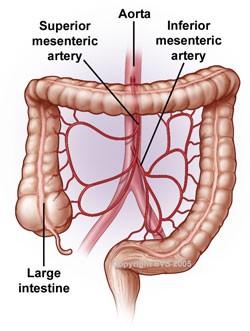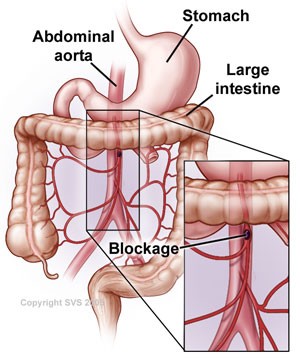Mesentric Ischemia
What is mesenteric ischemia?
The mesenteric arteries are the arteries that supply blood to your large and small intestines. Ischemia occurs when your blood cannot flow through your arteries as well as it should, and your intestines do not receive the necessary oxygen to perform normally. Mesenteric ischemia usually involves the small intestine, but it may also involve other intra-abdominal organs such as the colon, liver, and stomach.
Mesenteric ischemia usually occurs when one or more of your mesenteric arteries narrows or becomes blocked. When this blockage occurs, you can experience severe abdominal pain. Over time, often quickly, the blockage may worsen and cause tissues in your intestine to die because they lack enough blood flow.
Mesenteric ischemia usually occurs in people older than age 60. You may be more likely to experience mesenteric ischemia if you are a smoker or have a high cholesterol level.
Mesenteric ischemia can be either chronic or acute. Chronic means that you have had the condition and symptoms over a relatively long period of time. Acute means that the symptoms start abruptly and become very serious in a short period of time. Chronic mesenteric ischemia can progress without warning to acute mesenteric ischemia, sometimes very quickly.

What are the symptoms?
If you have chronic mesenteric ischemia, you may experience severe pain in your abdomen 15 to 60 minutes after you eat. This pain can occur in any part of the abdomen, but most commonly it occurs in the middle to upper part. The pain may last for as long as 60 to 90 minutes and then disappear. Unfortunately, it tends to return the next time you eat. Many people with chronic mesenteric ischemia begin losing weight because, although they may feel hungry, they do not want to eat because they experience the pain.
Sometimes the symptoms of chronic mesenteric ischemia can be vague and can be similar to those of other conditions. Therefore, your physician will evaluate you and order tests to rule out other problems before making a definite diagnosis. In addition to abdominal pain and weight loss, other symptoms that you might experience include:
With acute mesenteric ischemia, you may have sudden, severe stomach pain. Narcotic pain medications may not adequately alleviate the pain that is associated with mesenteric ischemia. With acute mesenteric ischemia, you may also experience nausea or vomiting.
What causes mesenteric ischemia?
Atherosclerosis, which slows the amount of blood flowing through your arteries, is a frequent cause of chronic mesenteric ischemia. Your arteries are normally smooth and unobstructed on the inside, but as you age, a sticky substance called plaque forms in the walls of your arteries. Plaque is made of fats and other materials circulating in your blood. As more plaque builds up, your arteries can narrow and stiffen. Eventually, enough plaque builds up to reduce blood flow through your arteries.
A clot, called an embolus, which travels to one of the mesenteric arteries and suddenly blocks the blood flow, is a common cause for acute mesenteric ischemia. These clots often originate in the heart and are more common among patients with an irregular heartbeat or heart disease.
Other conditions that may lead to mesenteric ischemia include:

Mesenteric ischemia is a serious condition that may come on and worsen quickly. It is extremely important that you go to your physician or the emergency room if you experience any of the symptoms.
What tests will I need?
Your physician may perform several tests to rule out other conditions with similar symptoms. First your physician will ask you questions about your general health, medical history, and symptoms. In addition, your physician will conduct a physical examination. Together these are known as a patient history and exam. As part of your history and exam, your physician will ask you if you smoke or have high blood pressure. Your physician will also want to know when and how often your symptoms occur as well as how long you have been experiencing them.
After the history and exam, if your physician suspects you may have chronic or acute mesenteric ischemia, he or she may perform additional tests to evaluate your bowel and circulation, such as:
How is a mesenteric ischemia treated?
The goal of treatment for mesenteric ischemia (both chronic and acute) is to re-open the artery to allow adequate blood flow to reach your intestine to allow it to work properly. Because this must be accomplished before permanent damage is done to the bowel, depending on the situation, your vascular surgeon may treat mesenteric ischemia as an emergency or as a scheduled procedure.
For chronic mesenteric ischemia, one treatment method is trans-aortic endarterectomy, which is an operation that removes the plaque that blocks your mesenteric artery. To perform this procedure, a vascular surgeon makes an incision in your abdomen, or side, and then removes the plaque contained in the inner lining of the blocked mesenteric artery. Another treatment option for chronic mesenteric ischemia is bypass surgery. In bypass surgery, the surgeon creates a detour around a narrowed or blocked section of the artery. To create this bypass, your vascular surgeon can use one of your veins or sometimes a tube made from man-made materials can be used as an alternative. Your vascular surgeon attaches the bypass above and below the blocked area, producing a new path for blood to flow to your intestines. Your vascular surgeon will advise you what procedure is best for you on the basis of your particular situation.
Angioplasty and stenting is a newer method for opening a mesenteric artery and bracing it open to allow the blood to flow through. It can sometimes be performed at the time of the angiogram. In an angioplasty procedure, your vascular surgeon inflates a small balloon inside a narrowed mesenteric artery. After widening the artery with angioplasty, your vascular surgeon may insert a stent, which is a tiny metallic mesh tube that can support your artery’s walls to keep your vessel wide open.
Treatment for acute mesenteric ischemia is usually an emergency procedure, since severe intestinal damage can occur rapidly in this setting. In some situations, your physician may use medications, called thrombolytic agents, to dissolve a clot, if one is found soon enough. To perform this treatment, your physician injects clot-dissolving medications into a blood vessel, often at the time of the angiogram. In some cases, the medications flow through your bloodstream to the clot and can disintegrate the clot. However, your vascular surgeon may need to remove the clot surgically, especially if there is evidence of intestinal damage or too little time is available for the thrombolytic agent to work.
In cases of acute mesenteric ischemia, portions of the intestine can be damaged beyond repair. In addition to restoring the blood flow to your intestinal arteries, some patients require surgery to remove the damaged portions of the intestine. This is a decision your vascular surgeon will make, often in conjunction with other surgical specialists.
Since the effectiveness, risk, and durability of each tool available for the treatment of mesenteric ischemia depends upon many issues, your vascular surgeon will advise you as to what procedure is the best for your particular situation.
















